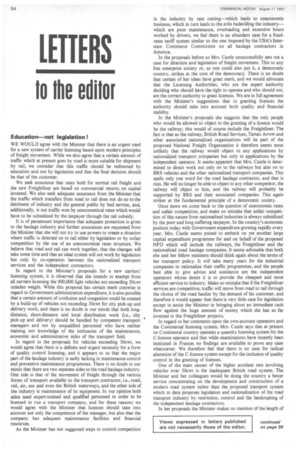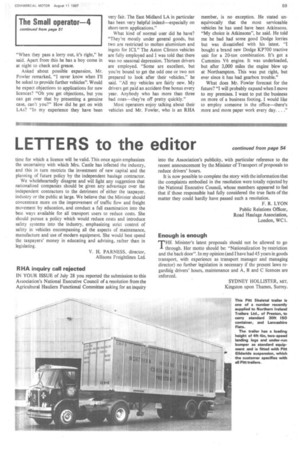LETTERS
Page 56

Page 61

If you've noticed an error in this article please click here to report it so we can fix it.
to the editor
Education—not legislation!
WE WOULD agree with the Minister that there is an urgent need for a new system of carrier licensing based upon modern principles of freight movement While we also agree that a certain amount of traffic which at present goes by road is more suitable for shipment by rail, we consider that this traffic should be redirected by education and not by legislation and that the final decision should be that of the customer.
We seek assurance that rates both for normal rail freight and the new Freightliner are based on commercial returns on capital invested. We also seek adequate assurance from the Minister that the traffic which transfers from road to rail does not do so to the detriment of industry and the general public by bad service, and, additionally, is not traffic won by uneconomical rates which would have to be subsidized by the taxpayer through the rail subsidy.
It is of paramount importance that adequate protection is given to the haulage industry and further assurances are requested from the Minister that she will not try to use powers to create a situation where traffic is directed on to rail either by legislation or by unfair competition by the use of an uneconomical rates structure. We believe that road and rail can work together, that the changes will take some time and that an ideal system will not work by legislation but only by co-operation between the nationalized transport services and the independent contractors.
In regard to the Minister's proposals for a new carriers' licensing system, it is observed that she intends to exempt from all carriers licensing the 900,000 light vehicles not exceeding 30cwt unladen weight While this proposal has certain merit costwise in regard to Government administration expenditure, it is also possible that a certain amount of confusion and congestion could be created by a build-up of vehicles not exceeding 30cwt for city pick-up and delivery work, and there is no doubt in our minds that both longdistance, short-distance and local distribution work (i.e., city pick-up and delivery) should be handled by competent transport managers and not by unqualified personnel who have neither training nor knowledge of the intricacies of the maintenance, economic and administrative sides of the transport field.
In regard to the proposals for vehicles exceeding 30cwt, we would agree that there is a definite and urgent necessity for a form of quality control licensing, and it appears to us that the major part of the haulage industry is sadly lacking in maintenance control and preventive maintenance programmes. There is no doubt in our minds that there are two separate sides to the road haulage industry. One side is that of the movement of freight through the various forms of transport available to the transport contractor, i.e., road, rail, air, sea and even the British waterways, and the other side of the industry is maintenance of its equipment. In our opinion both sides need expert-trained and qualified personnel in order to be licensed to run a transport company, and for these reasons we would agree with the Minister that licences should take into account not only the competence of the manager, but also that the company has adequate maintenance facilities and financial resources.
As the Minister has not suggested steps to control competition in the industry by rate cutting—which leads to uneconomic business, which in turn leads to the evils bedeviling the industry— which are poor maintenance, overloading and excessive hours worked by drivers, we feel there is an abundant case for a fixedrates tariff system similar to the one imposed by the USA's Interstate Commerce Commission on all haulage contractors in America.
In the proposals before us Mrs. Castle unsuccessfully sets out a case for direction and legislation of freight movement. This to any free enterprise society or, as one could also put it, a democratic country, strikes at the core of the democracy. There is no doubt that certain of her ideas have great merit, and we would advocate that the Licensing Authorities, who are the expert authority deciding who should have the right to operate and who should not, are the correct authority to grant licences. We are in full agreement with the Minister's suggestions that in granting licences the authority should take into account both quality and financial stability.
In the Minister's proposals she suggests that the only people who would be allowed to object to the granting of a licence would be the railway; this would of course include the Freightliner. The fact is that as the railway, British Road Services, Tartan Arrow and other associated nationalized organizations will be part of the proposed National Freight Organization it therefore seems most unlikely that the railway would object to any applications by nationalized transport companies but only to applications by the independent operator. It seems apparent that Mrs. Castle is determined to direct work not only on to the railways but also on to BRS vehicles and the other nationalized transport companies. This spells only one word for the road haulage contractor, and that is ruin. He will no longer be able to object to any other competitor, the railway will object to him, and the railway will probably be supported by BRS and their associated companies. This again strikes at the fundamental principle of a democratic society.
Once more we come back to the question of uneconomic rates and unfair competition, and make no mistake that unfair competition of this nature from nationalized industries is always subsidized by the poor and long-suffering taxpayer. In the country's economic position today with Government expenditure growing rapidly every year, Mrs. Castle seems poised to embark on yet another large capital expenditure programme for and on behalf of the proposed NFO which will include the railways, the Freightliner and the nationalized road haulage companies. It seems advisable that both she and her fellow ministers should think again about the terms of her transport policy. It will take many years for the industrial companies to rationalize their traffic programmes, and the people best able to give advice and assistance are the independent operators whose desire it is to provide the cheapest and most efficient service to industry. Make no mistake that if the Freightliner services are competitive, traffic will move from road to rail through the choice of the road haulier by the demand of his customer, and therefore it would appear that there is very little case for legislation except to assist the Minister in bringing about an immediate cash flow against the huge amount of money which she has so far invested in the Freightliner projects.
In regard to her comments upon the own-account operators and the Continental licensing system, Mrs. Castle says that at present no Continental country operates a quantity licensing system for the C-licence operator and that while examinations have recently been instituted in France., no findings are available to prove any case whatsoever. We therefore feel that there is no case for radical alteration of the C-licence system except for the inclusion of quality control in the granting of licences.
One of the main causes of the higher accident rate involving vehicles over 30cwt is the inadequate British road system. The Minister and her colleagues would be doing the country a better service concentrating on the development and construction of a modern road system rather than the proposed transport system which to date proposes legislation and nationalization of the road transport industry by restriction, control and the bankrupting of the independent haulage contractors.
In her proposals the Minister makes no mention of the length of "When they pass a lorry out, it's right," he said. Apart from this he has a boy come in at night to check and grease.
Asked about possible expansion, Mr. Fowler remarked, "I never know when I'll be asked to provide further vehicles". Would he expect objections to applications for new licences? "Oh you get objections, but you can get over that by presenting a genuine case, can't you?" How did he get on with LAs? "In my experience they have been very fair. The East Midland LA in particular has been very helpful indeed—especially on short-term applications."
What kind of normal user did he have? "They're mostly under general goods, but two are restricted to molten aluminium and ingots for ICI." The Aston Clinton vehicles are fully employed and I was told that there was no seasonal depression. Thirteen drivers are employed. "Some are excellent, but you're bound to get the odd one or two not prepared to look after their vehicles," he said. "All my vehicles are fairly new. My drivers get paid an accident-free bonus every year. Anybody who has more than three bad ones—they're off pretty quickly."
Most operators enjoy talking about their vehicles and Mr. Fowler, who is an RHA member, is no exception. He stated unequivocally that the most serviceable vehicles he has used have been Atkinsons. "My choice is Atkinsons", he said. He told me he had had some good Dodge lorries but was dissatisfied with his latest. "I bought a brand new Dodge KP700 tractive unit for a 20-ton combination. It's got a Cummins V6 engine. It was underloaded, but after 3,000 miles the engine blew up at Northampton. This was put right, but ever since it has had gearbox trouble."
What does Mr. Fowler forecast for the future? "I will probably expand when I move to my premises. I want to put the business on more of a business footing. I would like to employ someone in the office—there's more and more paper work every day. . ."












































































































